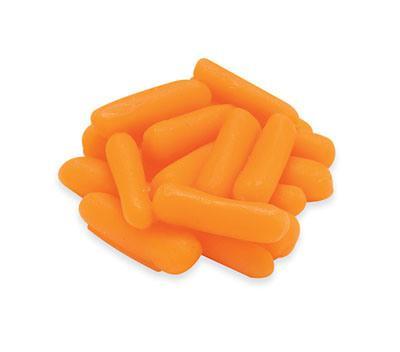
Dd you get this rather alarming email about baby carrots?
The following is information from a farmer who grows and packages carrots for IGA, METRO, LOBLAWS, etc.
The small cocktail (baby) carrots you buy in small plastic bags are made using the larger crooked or deformed carrots which are put through a machine which cuts and shapes them into cocktail carrots . most people probably know this already.
What you may not know and should know is the following: once the carrots are cut and shaped into cocktail carrots they are dipped in a solution of water and chlorine in order to preserve them (this is the same chlorine used your pool) since they do not have their skin or natural protective covering, they give the m a higher dose of chlorine. You will notice that once you keep these carrots in your refrigerator for a few days, a white covering will form on the carrots, this is the chlorine which resurfaces. At what cost do we put our health at risk to have esthetically pleasing vegetables which are practically plastic?
Chlorine is a very well known carcinogen.
If you care about your family and friends, pass it on.
I got alarmed too, although I don’t buy or eat “baby” carrots.
So I did a search on the net and found this:
http://urbanlegends.about.com/od/fooddrink/a/baby_carrots.htm
Analysis: It’s true that baby carrots (aka “cocktail carrots”) were originally produced by cutting and trimming odd-shaped or broken carrots into a uniform, smaller size (though now they’re made from carrots grown specifically for the purpose).
It’s also true that baby carrots are typically washed in a chlorine-and-water solution before packaging (as are other ready-to-eat fresh vegetable products, such as bagged salads).
None of this is harmful to your health, says Dr. Joe Schwarcz, professor of chemistry at McGill University. The whole point of washing vegetables with chlorinated water is to protect consumers’ health by reducing bacteria that could cause foodborne illnesses.
The “white covering” mentioned above which sometimes appears on the surface of refrigerated carrots (known as “white blush” in the industry) is a harmless discoloration resulting from moisture loss and/or abrasion during storage. It has nothing to do with chlorine and does not affect the taste or nutritional value of the carrots.
Now that you know the email is not true, please don’t forward it! Instead send this post to the person who’d sent the email to you.
~Eowyn

